Cardiovascular Technologist
Entry Level Qualification
12
Career Fields
Allied & Para Medical Science
For Specially Abled

Career Entrance Exam
About Career
PARTICULARS | DESCRIPTION |
Name | Cardiovascular Technologist |
Purpose | Diagnose Heart Disease |
Career Field | Allied & Para Medical Science |
Required Entrance Exam | JIPMER MSC/MPH, AIIMS MSC, AIIMS BSC, AIIMS PG INICET |
Average Salary | 300000 - 400000 Rs. Per Year |
Companies For You | Medanta, Apollo, BLK Super Speciality Hospital & Many More |
Who is Eligible | Class 12th Pass |
Cardiovascular Technologists are specialized healthcare professionals who manage and operate the machines used in the diagnosis and treatment of heart, lung, and several other blood vessel disorders/ailments. Cardiovascular Technologists also assist surgeons and physicians in conducting invasive and non-invasive diagnostic tests of cardiovascular and pulmonary systems; preparing patients for surgery, implanting pacemakers, monitoring heart-lung machines, etc.
So before we go on to discuss what roles and responsibilities Cardiovascular Technologists are involved in, let us get a fair idea of what are invasive and non-invasive diagnostic procedures.
Invasive diagnostic tests are tests such as blood tests or cardiac catheterization that require physicians to use instruments to physically enter the body to assess the patient’s cardiac condition. Cardiac catheterization involves the insertion of a catheter (a thin tube) into the heart’s chamber or a blood vessel. Examples of cardiac catheterization are pacemakers and defibrillators, valve assessment, pulmonary angiography, etc. These invasive diagnostic procedures are performed in cases of stroke, heart attack, or other cardiovascular diseases.
Whereas a non-invasive diagnostic test includes minimal or no incisions in the body. These usually include an Electrocardiogram (EKG or ECG records the electrical activity of the heart including the timing and duration of each heartbeat and determines the possibility or occurrence of heart attack), Ambulatory Electrocardiography and Holter Monitoring (examines the abnormal electrical activity in the heart and also helps in determining most appropriate treatments), Chest X-Ray (helps in determining enlargement of heart or accumulation of fluid post-heart attack), Echocardiogram (is used to produce images of the heart’s structure and size & determines abnormal heartbeat, etc.), and so on.
Now that you know your area of work, let us understand what exactly you would do as a Cardiovascular Technologist
As a Cardiovascular Technologist, you would be involved in using specialized electronic test equipment, recording devices, or laboratory instruments to observe, monitor, and evaluate the patient's condition with any suspected or known heart diseases. You would monitor, operate, and keep track of blood pressure and heart rate using electrocardiogram (EKG) equipment during diagnosis or treatments. You would also be involved in implanting pacemakers, measuring heart wall thickness and chamber sizes to identify abnormalities as well as assisting physicians with vascular procedures like angioplasty, vascular bypass, etc.
Key Roles and Responsibilities
As a Cardiovascular Technologist, you may be engaged in one of the many roles and responsibilities:
1. You would obtain and record patient identification, medical history, or test results.
2. You would monitor patients' blood pressure and heart rate using electrocardiogram (EKG) equipment during diagnostic or therapeutic procedures to notify the physician if something appears wrong.
3. You would conduct electrocardiogram (EKG), phonocardiogram, echocardiogram, stress testing, or other cardiovascular tests to record patients' cardiac activity, using specialized electronic test equipment, recording devices, or laboratory instruments. (An Electrocardiogram (EKG or ECG) measures how the patient’s heart is functioning using the electrical activity of the heart; a phonocardiogram records the activities (sounds) made by the heart and an Echocardiogram measures the heart’s movement via an ultrasound or echo test)
4. You would be involved in selecting, assembling, setting up well, and testing the heart-lung machine to ensure that the machine and associated equipment are functioning according to specifications.
5. You would check, test, and maintain cardiology equipment, making minor repairs when necessary, to ensure proper operation.
6. You would also assist physicians in the diagnosis and treatment of cardiac or peripheral vascular treatments, such as implanting pacemakers or assisting with balloon angioplasties to treat blood vessel blockages, etc.
Career Entry Pathway
Class 10 all subjects as per the scheme of studies – Class 11-12 Physics, Chemistry, and Biology along with any other subject as per the scheme of studies – B.Sc. in Cardiovascular Technology/ Cardiac Care Technology or similar – Become Cardiovascular Technologist.
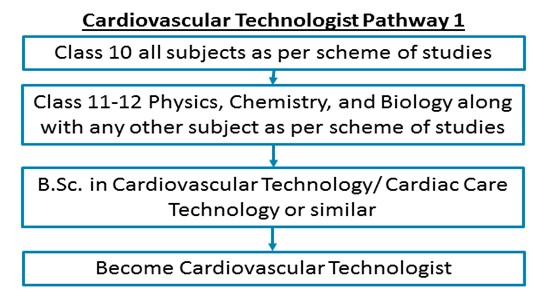
After completing Class 11-12 Physics, Chemistry, and Biology along with any other subject as per the scheme of studies you can go for a B.Sc. in Cardiovascular Technology/ Cardiac Care Technology or similar. After graduation degree, you can start working directly as a Cardiovascular Technologist.
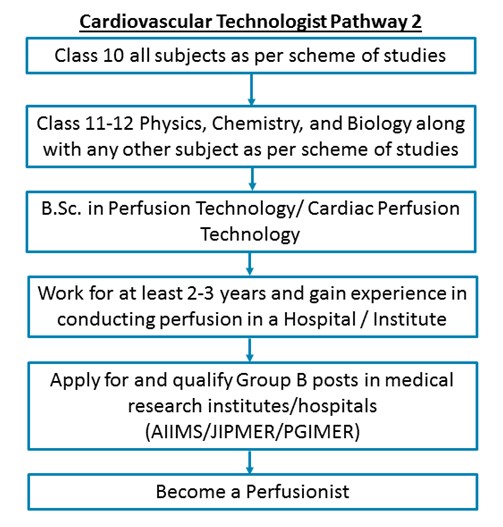
This career entry pathway is for those students who wish to become a Perfusionist in government medical hospitals. After completing Class 11-12 Physics, Chemistry, and Biology along with any other subject as per the scheme of studies you can go for a B.Sc. in Perfusion Technology/ Cardiac Perfusion Technology. After graduation, you must work for at least 2-3 years and gain experience in conducting perfusion in a Hospital / Institute and apply for and qualify for Group B posts in medical research institutes/hospitals (AIIMS/JIPMER/PGIMER) to become a Perfusionist.
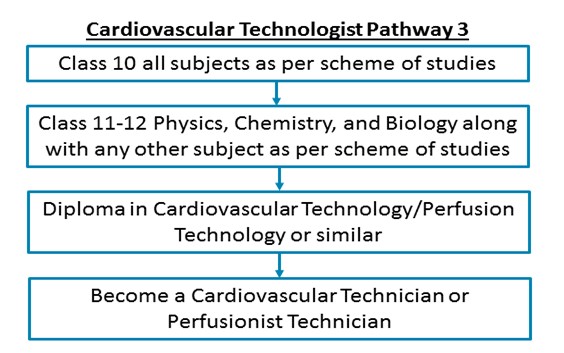
This is an entry-level pathway for students who wish to start working after completing higher secondary education. After completing Class 11-12 Physics, Chemistry, Mathematics (optional), and Biology along with any other subject as per the scheme of studies you pursue a Diploma in Cardiovascular Technology/Perfusion Technology or similar and start working as a Technician although a Bachelor’s degree is recommended to practice as a Technologist in government or private hospitals.
Required Qualification & Competencies
1. After completing higher secondary education, you can pursue a Bachelor of Science (B.Sc.) in B.Sc. in Cardiovascular Technology/ Cardiac Care Technology or similar and start working directly as a Cardiovascular Technologist in government or private hospitals.
2. After completing higher secondary education you can go for a Bachelor in Cardiovascular Technology/ Cardiac Perfusion Technology and work for at least 2-3 years to become eligible for the post of Perfusionist (Group B) in several medical research hospitals like AIIMS/JIPMER/PGIMER etc.
3. After completing higher secondary education you can go for a Diploma in Cardiovascular Technology/ Perfusion Technology and start working as a Cardiovascular Technician but a bachelor’s degree is recommended to practice as a Cardiovascular Technologist/ Perfusionist.
MINIMUM EDUCATION REQUIRED | MAXIMUM EDUCATION REQUIRED |
Under Graduate Undergraduate Degree / Honours Diploma / Graduate Diploma (equivalent to a Degree) Programs for which the minimum eligibility is a pass in Higher Secondary / Class XII School Leaving examination. | Post Graduate Postgraduate Degree / Diploma / Certificate Programs for which the minimum eligibility is a pass in Graduation / equivalent Diploma program like Honours Diploma or Graduate Diploma. |

Competencies Required
Interest
1. Realistic: You should have an interest in Realistic Occupations. Realistic occupations involve more practical and hands-on activities than paperwork or office work. Realistic occupations often involve physical activities for getting things done using various tools and equipment.
2. Conventional: You should have interests in Conventional Occupations. Conventional occupations involve repetitive and routine tasks as well as fixed processes or procedures for getting things done. These occupations involve working more with data, systems, and procedures and less with ideas or creativity.
3. Social: You should have an interest in Social Occupations. Social occupations involve helping or assisting others; these involve working with and communicating with people to provide various services; these may involve educating and advising others.
Knowledge
1. Healthcare Services: Knowledge of different fields that are related to offering various types of healthcare services to people; assisting physicians and surgeons to carry out diagnosis, treatment, and prevention of human diseases, ailments, and disorders. This includes knowledge of different practices apart from medicine which are used to treat and prevent human diseases or to provide holistic healthcare and wellness. This also includes knowledge about drugs and medicines.
2. Personal Care Service: Knowledge of how to provide various assistance and services to others. This includes looking after the needs of individuals, understanding what they need, and providing all assistance at home or elsewhere.
Skills
1. Active Listening: Giving full attention to what other people are saying, understanding the points being made by others, asking questions, etc.
2. Critical Thinking: Skills in the analysis of complex situations, using logic and reasoning to understand the situations and take appropriate actions or make interpretations and inferences.
3. Judgment and Decision Making: Skills in considering the pros and cons of various decision alternatives; considering costs and benefits; and making appropriate and suitable decisions.
4. Problem Solving: Skills in analysis and understanding of problems, evaluating various options to solve the problems, and using the best option to solve the problems.
5. Technical: Skills in using various technologies and technical methods including cardiovascular knowledge and use of medical technologies, performing diagnostic procedures, etc.
Abilities
1. Deductive Reasoning: The ability to apply general rules and common logic to specific problems to produce answers that are logical and make sense. For example, understanding the reasons behind an event or a situation using general rules and common logic
2. Inductive Reasoning: The ability to combine pieces of information from various sources, concepts, and theories to form general rules or conclusions. For example, analyzing various events or situations to come out with a set of rules or conclusions
3. Inter-Personal: The ability to build and maintain good relationships with others at workplaces and elsewhere.
4. Problem Sensitivity: The ability to tell when something is wrong or is likely to go wrong. It does not involve solving the problem, only recognizing there is a problem.
Personality
1. You are always or mostly organized in your day-to-day life and activities.
2. You remain calm in emergencies and work well under pressure
3. You always feel secure in your surroundings and most situations.
4. You are a soft-hearted person sometimes.
5. You trust others sometimes but not always.
6. You act independently sometimes but do not do so at some other times.
7. You are always practical in most situations.
Career - Job Opportunities & Profiles
After completing your education, with a degree in Cardiovascular Technology, you will work in a hospital or imaging units/ Diagnostic and interventional cardiac catheterization labs. You may find work in
1. Government/Private hospitals (in cardiology department) such as All India Institute of Medical Sciences (AIIMS), Safdarjung Hospital, Sir Ganga Ram Hospital, Fortis Escorts Heart Institute, Gangaram Hospital, Medanta, Apollo, BLK Super Speciality Hospital, Care Hospital, Artemis, Narayana Hrudayalaya, Asian Heart Institute and Research Centre, B. M. Birla Heart Research Centre, etc.
Career Growth
After having completed the required education and training you would begin as:
Cardiovascular Technician – Assistant Cardiovascular Technician – Associate Cardiovascular Technologist – Cardiovascular Technologist – Senior Technical Officer – Chief/ Head of Cardiovascular department
Salary Offered
1. As a Trainee or Technician at Entry level, you may earn around Rs. 20,000 to Rs. 25,000 per month.
2. At Junior-level with an experience of 1- 4 years you may earn around Rs. 35,000 – 50,000 per month or more.
3. At Mid-level with an experience of 5-12 years you may earn around Rs. 65,000 – 90,000 per month or more.
4. At Senior-level with an experience of 12-20 years you may earn around Rs. 70,000 – 1,40,000 per month or more.
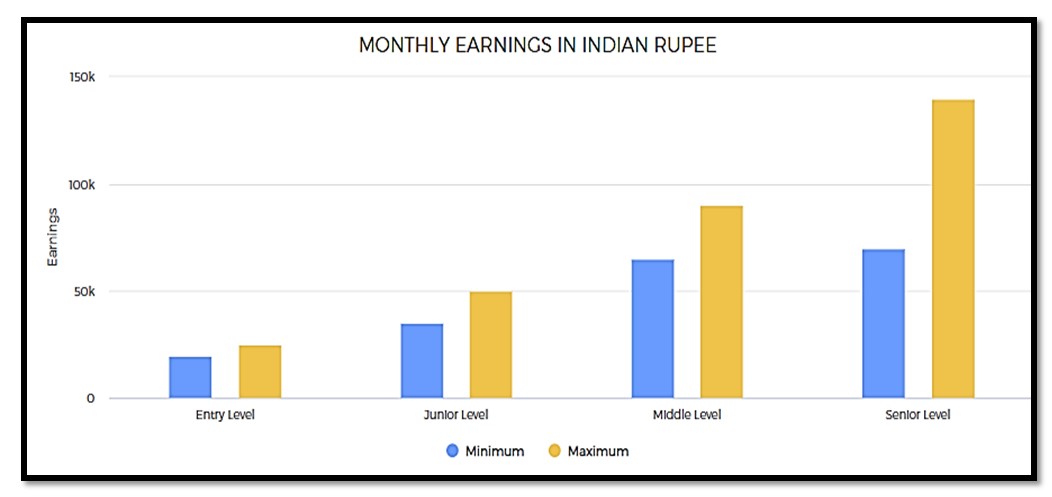
Monthly Earnings In Indian Rupee
Entry Level | Junior Level | Mid Level | Senior Level | ||||
Min Earning | Max Earning | Min Earning | Max Earning | Min Earning | Max Earning | Min Earning | Max Earning |
20000 | 25000 | 35000 | 50000 | 65000 | 90000 | 70000 | 140000 |
1. Entry level: 0 - 2 years of work experience
2. Junior Level: From 1 to 12 years of work experience
3. Mid-Level: From 5 to 20+ years of work experience
4. Senior Level: From 10 to 25+ years of work experience (there could be exceptions in some high-end technical, financial, engineering, creative, management, sports, and other careers; also shortly, people will reach these levels much faster in many careers and some careers, these levels will have no meaning as those careers will be completely tech skill driven such as even now, there is almost no level in a Cyber Security Expert’s job)
Work Activities
1. Addressing grievances and resolving conflicts: Handling complaints and grievances to resolve; resolving conflicts among co-workers or others at the workplace or outside of your work.
2. Assisting and caring for people: Assisting people in availing of services; taking care of people in different situations; offering help and services to others.
3. Analysing and interpreting data and information: Analysis of data and information to find facts, trends, reasons behind situations, etc.; interpretation of data to aid in decision-making.
4. Communicating with co-workers and others: Communicating with people in writing, verbally or otherwise inside your workplace and various other people who have professional relationships with your place of work including vendors, government officials, etc., or with people at large
5. Decision-making and problem-solving: Analysis of data and information; evaluation of alternative decisions and results of decisions; taking the right decisions and solving problems.
6. Developing and maintaining interpersonal relationships: Developing professional relationships with co-workers and others outside organizations and maintaining good relationships.
7. Getting Information and learning: Observing, hearing, reading, using computers, or otherwise obtaining information and learning from it.
8. Handling administrative activities: Handling various administrative tasks and managing day-to-day operations.
9. Inspecting equipment, systems, structures, and materials: Inspecting equipment, systems, structures, and materials to ascertain quality, performance, defects, causes of errors, etc.
10. Inspecting situations, events, and people: Inspecting situations, events, and people to understand the reasons and causes for the situation or events to happen; inspecting people to understand reasons behind their behavior and actions.
11. Managing and supervising: Managing and supervising the work of others; setting goals; giving instructions; monitoring work performance, etc.
12. Updating and using relevant knowledge: Keeping updated with the latest knowledge relevant to your fields of work and use of the relevant knowledge in getting things done.
13. Using computers for work: Using computers for day-to-day office work; using computer software for various applications in day-to-day professional work; entering data and processing information; for writing.
14. Working in a team: Working in a team of people; developing a team; and maintaining professional relationships among team members.
Future Prospects
1. According to the India Brand Equity Foundation (IBEF), the healthcare sector in India is one of the fastest-growing sectors and will reach an estimated of around $280 Billion by the year 2024.
2. According to FICCI reports, the Indian Health industry is witnessing an influx of new cardiovascular technologies in diagnostics. Many private and government hospitals have adopted high-end technological services catering to the rising demands. Therefore a career in this allied healthcare sector would witness immense demand in the upcoming years.
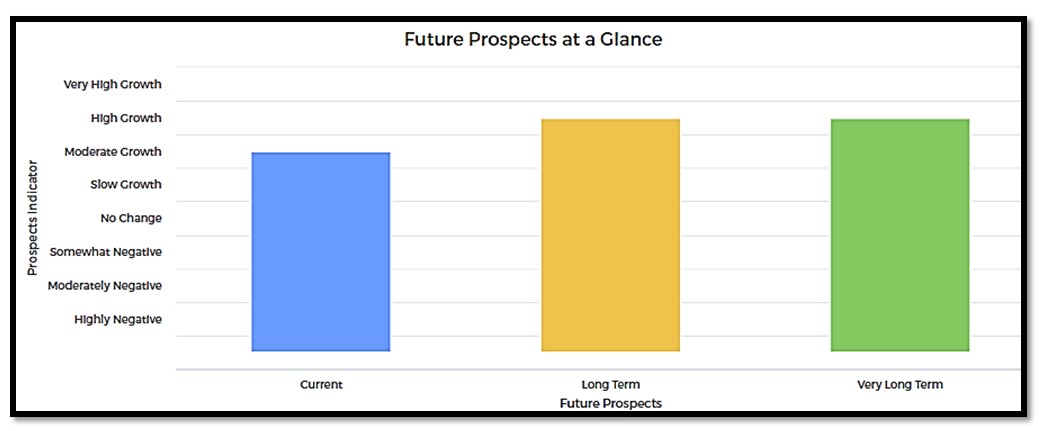
Future Prospects At A Glance
Current (0-1 year) | Long Term (2-5 years) | Very Long Term (6-10 years) |
Moderate Growth | High Growth | High Growth |


